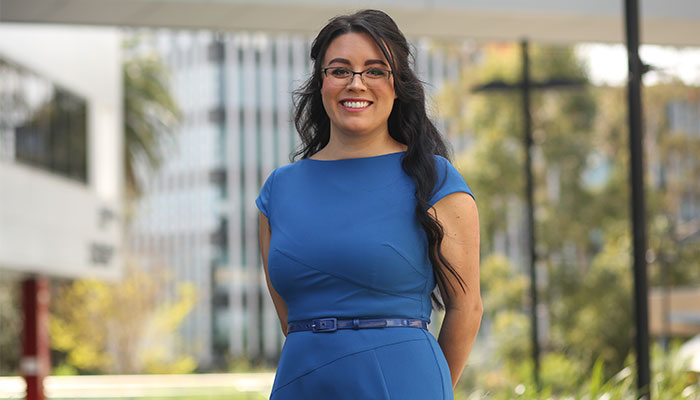What is it about Christmas that makes people want to open their wallets?

Retail rush: when shoppers feel happy they tend to buy more, says Associate Professor Jana Bowden.
Retail spending this Christmas is predicted to top $52.7 billion, up 2.6 per cent on the same trading period in 2018.
While festive feelings typically translate into greater consumer spend, the psychology of shopping will be a key determinant on just how much consumers will be prepared to outlay.
From a retail perspective, when consumers feel happy, they tend to buy more.
This is the key difference between regular sales – like the recent Black Friday and Cyber Monday sales – and the emotionally connected Christmas shopping event which often pulls on people’s heart strings due to fond childhood memories and family gatherings.
Playing on emotions
It comes as no surprise that brands attempt to tap into this emotional narrative in their advertising and promotions during the festive season, and this emotional connection drives shopper traffic and shopper traffic drives spend.
Consumers are tipped to splurge on a range of retail from apparel, including footwear and accessories, to household goods and hospitality. Roy Morgan expects food to show the strongest growth from Christmas 2018 with predictions of 3.2 per cent growth to around $21.7 billion.
Consumers are often irrational purchasers and rely more on how they feel, rather than the information that they receive. Brands that can create an emotional connection and tap into consumer’s self-identity can translate this into consumer spend.
The psychology of consumer emotions can tell us a lot about why we buy at Christmas. Especially when it comes to digital dopamine and the pressure of reciprocity in gift giving.
The more you wait, the more you want
Consumers love to shop especially around major holiday periods such as Christmas. Online shopping in particular is expected to spike in the December period with sales reaching $7.6 billion.
What is especially interesting is that the anticipation that comes with buying online has been found to be more rewarding than the instant retail therapy of shopping in-store
Research has found that consumers experience more excitement, and more delight, when buying online and receiving purchases in the mail.
By checking our email inbox deals, then sifting through the myriad of buying options online, we extend the pleasure of the shopping experience. In fact, 66 per cent percent of consumers in the US said they felt more excited when their online purchases arrived in the mail than when they bought in store.
We see it, want it, research it, select it, wait for it, receive it, wrap it and finally enjoy gifting it (or keep it).

Digital dopamine hit: even words that convey the idea of a bargain trigger the release of pleasurable chemicals in our brain.
Online shopping taps into an all-powerful psychological mechanism – pleasurable anticipation and delayed gratification. This anticipatory pleasure heightens the shopping experience and builds the excitement in the lead up to Christmas.
Digital dopamine, FOMO and FOGG
Christmas advertising drives our desire to secure a good deal. Key terms such as limited edition, bundle, Christmas Edition set, limited quantities, on sale, offer ends and hurry! not only lead us to feel like there is extra value on offer, but they also give us a sense of urgency.
Retailers use these psycholinguistic cues to trigger our cognitive calculations of value and this in turns motivates us to buy, buy, buy.
These triggers are not something that we can rationally control.
Each time we shop, or even just anticipate a bargain, our neurotransmitters give us a pleasurable hit of the chemical dopamine. Dopamine is what gives us that flush of adrenalin, and excitement that we are now accustomed to when we see a bargain and anticipate the reward of buying on discount.
- New scam-busting tool kit could save your number from being hijacked
- Are your home-grown vegies safe to eat?
If a deal stands out as exceptional – ‘Christmas release, limited time only!’ – the chemical hit that leads to the ‘shopper’s high’ is even more pronounced.
Soon enough FOMO, or the fear of missing out, coupled with FOGG, the fear of gift giving, take over.
Christmas shopping can fast become an addictive spiral which is paradoxically full of excitement and also, anxiety.
The gift of reciprocity
While we don’t expect to be given gifts, Christmas does come with the tradition of gift-giving. Behind this seemingly altruistic ritual lies a major psychological driver – the concept of reciprocity.
Reciprocity refers to the expectation that when we receive a gift, we will also feel compelled to give a gift.
While we might feel social and financial pressure to spend on others, it is not actually the gift that counts, it’s the reaction of the recipient of our gift that is most highly anticipated. There is a strong element of respect and reputation in gift-giving. We judge gift-givers based on what they give us. Gifts are symbolic tokens of appreciation, friendship, love and power. They create and strengthen social relationships.
Research examining gender differences in gift-receiving found that women give gifts to more recipients, plan and shop earlier, spend more time considering gifts for each recipient, and feel more satisfied with their choices than men. Men on the other hand have been found to take Christmas shopping lightly and see it as a relatively trivial pursuit.
Gifts carry with them both responsibility and, whether we like it or not, obligation.

Powerful psychology: many people find it difficult to ignore festive messages that buying gifts strengthens the bond of relationships, says Associate Professor Jana Bowden (pictured).
At the core, the fabric of Christmas is about social and emotional connection, love and a sense of belonging. Marketers tap into this deep set of values and underlying needs of ours at Christmas time to employ tactics to draw us in and make us spend.
The idea of buying gifts to strengthen the bonds of our relationships is a guilt tactic that is just too psychologically difficult to avoid.
When we see advertisements of happy families crowded around the Christmas tree unwrapping the presents with joyful expressions on their faces – then despite our rational minds and our best attempts to avoid the hype and spending trap – the marketers have won.
Associate Professor Jana Bowden is a retail marketing, consumer engagement and consumer behaviour researcher in the Department of Marketing, Macquarie Business School, Macquarie University.



